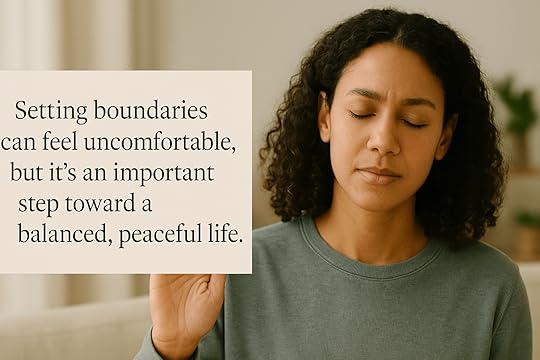How to Set Boundaries Without Feeling Guilty
Have you ever said ���yes��� when you really wanted to say ���no���? Or felt drained after agreeing to something that didn���t feel right for you?
You���re not alone.
Learning how to set healthy boundaries is one of the most powerful things you can do for your mental health ��� but that doesn���t mean it���s easy. Many of us feel guilty for setting limits, especially if we���re used to keeping everyone else happy.
But here���s the truth: Setting boundaries is not selfish. It���s self-care.
Let���s talk about why we feel guilty, how to shift that mindset, and some simple ways to set boundaries with confidence and kindness.

Guilt is often a sign that you���re doing something new. It shows up when you go against old habits or beliefs ��� especially if you were raised to always be ���nice,��� ���helpful,��� or ���selfless.���
Some common thoughts behind boundary guilt include:
���If I say no, they���ll think I don���t care.���
���I don���t want to disappoint anyone.���
���It feels rude to put myself first.���
These thoughts may have served a purpose in the past, like helping you feel accepted or keeping the peace. But in adulthood, they can lead to burnout, anxiety, and resentment.
Reframing the Guilt: You���re Not Being Mean ��� You���re Being Honest
Here���s something important to remember: You can care about someone and still say no.
Think of boundaries as emotional fences. They���re not walls that push people away ��� they���re gates that help you decide what comes in and what stays out.
Try shifting your mindset from guilt to self-respect with thoughts like:
���I���m allowed to take care of myself.���
���Saying no helps me show up more fully when I say yes.���
���Boundaries protect my energy and my peace.���
How to Set Boundaries Without Feeling Like a Bad PersonSetting boundaries doesn���t have to be cold or harsh. You can be clear and kind at the same time. The key is to speak from a place of honesty and calm.
Here are a few simple phrases you can use:
���Thanks for thinking of me, but I���m not available for that right now.���
���I���m focusing on my mental health this week and need some space.���
���I care about you, but I don���t have the capacity to help with that.���
You don���t have to explain your every decision. A clear, respectful response is enough.
 What Happens When You Start Setting Boundaries
What Happens When You Start Setting BoundariesAt first, it might feel uncomfortable. People who are used to you always saying ���yes��� might be surprised. But with time, healthy boundaries lead to better relationships ��� with others and with yourself.
You���ll notice:
Less stress and overwhelm
More time and energy for what matters
A stronger sense of self-respect
And maybe best of all? You���ll stop feeling guilty for choosing you.
Final Thoughts: Boundaries Are a Form of Self-Respect
If you���ve spent years putting others first, it���s natural to feel unsure when you start setting limits. But just because something feels uncomfortable doesn���t mean it���s wrong.
Every time you set a boundary, you���re reminding yourself (and others):
My needs matter too.
Start small. Be kind to yourself. And remember ��� saying ���no��� isn���t rejection. It���s redirection toward a life that���s more balanced, more peaceful, and more you.
If you are interested in help with boundaries, whether outpatient or IOP, call the Houston DBT Center. We’re here to help. 713-973-2800 ��or submit the form on our website.
The post How to Set Boundaries Without Feeling Guilty appeared first on Houston DBT Center.



